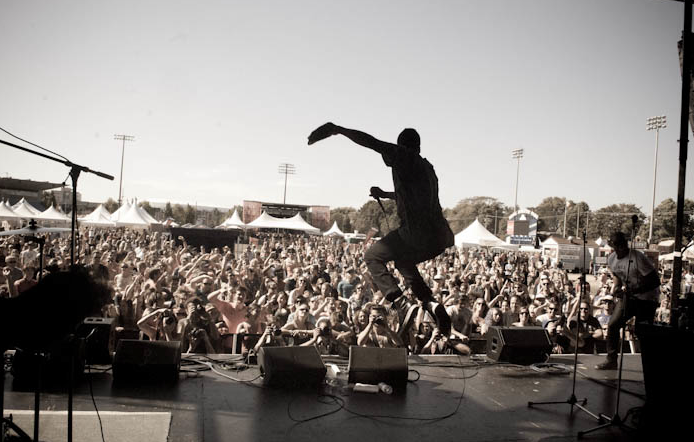If it ain’t broke, don’t fix it
Grand Analog’s latest LP a symbol of its ripened sound
When I spoke with Ofield Williams – the Grand Analog DJ and oft-hip hop producer – his group’s third and latest record Modern Thunder had already garnered critical acclaim since its release on August 20.
As he aptly described it, the 14-track disc featuring guests from Shad to Maylee Todd to Saukrates is a polished effort, emblematic of the five-piece outfit’s maturation within an evolving and unpredictable music industry.
“[Modern Thunder] is a combination of a level of respect for the music we all grew up with, but at the same time, it’s a sign of the times as far as taking something that doesn’t need fixing, and altering it in a fashion that not only accommodates today’s generation, but maintains its integrity... its relationship to what we know about the past.
“It’s also a reflection of the ever-changing scene, the evolvement of what people are in to, listening to, respecting and calling their own.”
Since 2007’s Calligraffiti, once described as a “collection of dub-infused funk rap,” Grand Analog has been adding a unique dynamic to Canadian hip hop. Along with Ofield’s brother, frontman and lead emcee Odario Williams, the group stands out with bassist Warren Bray, keyboardist Alister Johnson and drummer TJ Garcia who lend live instrumentation to a diverse catalogue of jazz-hop, reggae and afrobeat-inspired jams.
Earning acclaim with its 2009 sophomore effort Metropolis Is Burning – which won a Western Canadian Music Award – Grand Analog persisted with the style that brought them success and took a methodical approach to completing Modern Thunder.
“ ... it’s a sign of the times as far as taking something that doesn’t need fixing, and altering it in a fashion that not only accommodates today’s generation, but maintains its integrity… its relationship to what we know about the past.
“We move gracefully, not hastefully,” Williams confirms, quoting a verse from one of Winnipeg’s first hip hop groups, Mood Ruff (also fronted by his brother Odario).
“With Grand Analog,” he continues, “initially it was meant to be a trilogy. I don’t know where that stands right now, but in relation to our initial feeling, [Modern Thunder] is just a mature album that definitely relates to things we’ve said in the past on our last two albums.
“We brought in people who we genuinely feel are true to their craft and their art form. Working with Shad was a natural fit, we’ve toured as a package before. Time has told we work well together... Maylee Todd is an ever-evolving artist herself, and someone we consider more on the experimental side. It expresses how much we’re open to new collaborations but how we can still relate to past, present and future as far as music is concerned.”
Modern Thunder’s opener “Lion Head” is a testament to the evolution. As powerful, jabbing horns and hip hop percussion lay a foundation, Odario’s distant voice is heard proclaiming “It’s been a long long time/Hands up!” Three verses and a hook is just the beginning, though – drum and keyboard instrumentals overlay tight production behind the boards as the four minute track becomes the manifesto of the entire LP.
“The Great Rhyme Dropper” featuring Toronto’s Shad is another unpretentious joint that at once fits the mold of Grand Analog’s practiced aesthetic, but moves beyond as one of the great hip hop songs of the year. It also has a feel good vibe and a comic book-inspired music video that will remind heads why style, lyricism and flow are always timeless markers of a real emcee.
“When you listen to it,” Williams says of the record, “without a doubt you can sense it’s something that’s gotten better over time.
“People are always asking me ‘Yo man, how are things going?’ or ‘What’s new?’ and I really don’t like that question because, after a certain while as an artist, you know what it is you do and you know your craft... so it’s not really a question of ‘What’s new’, it’s more like ‘I’m still doing the same shit, I’m just better at it.’”









